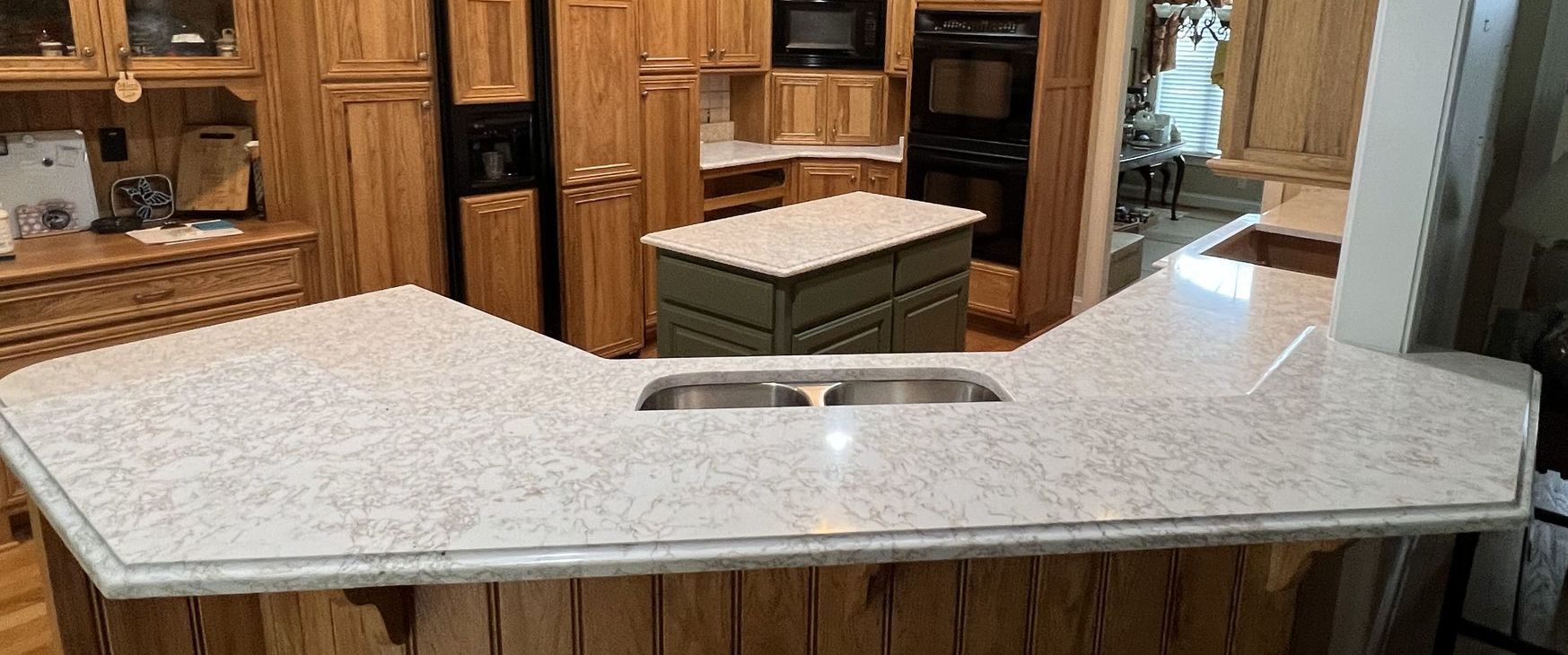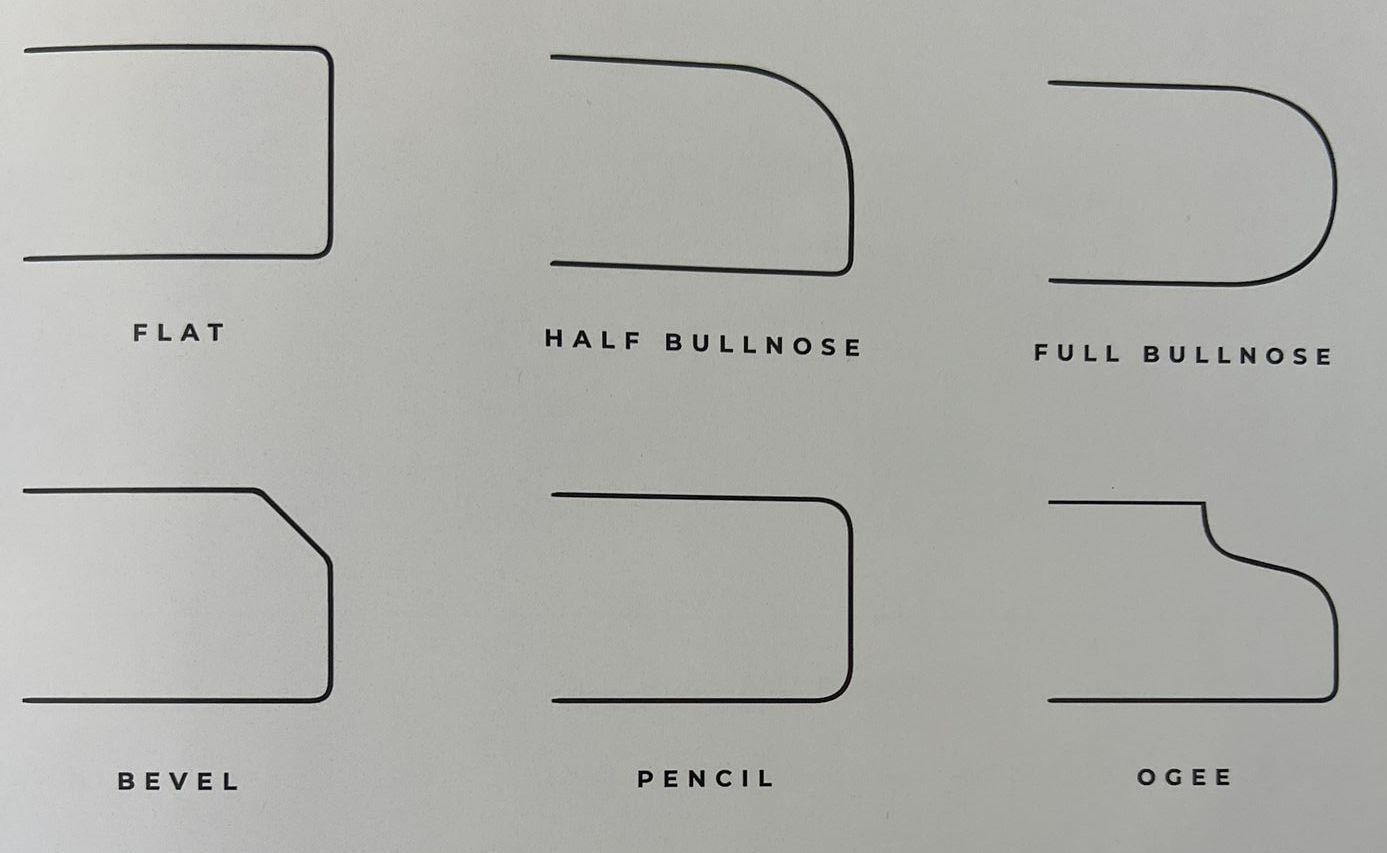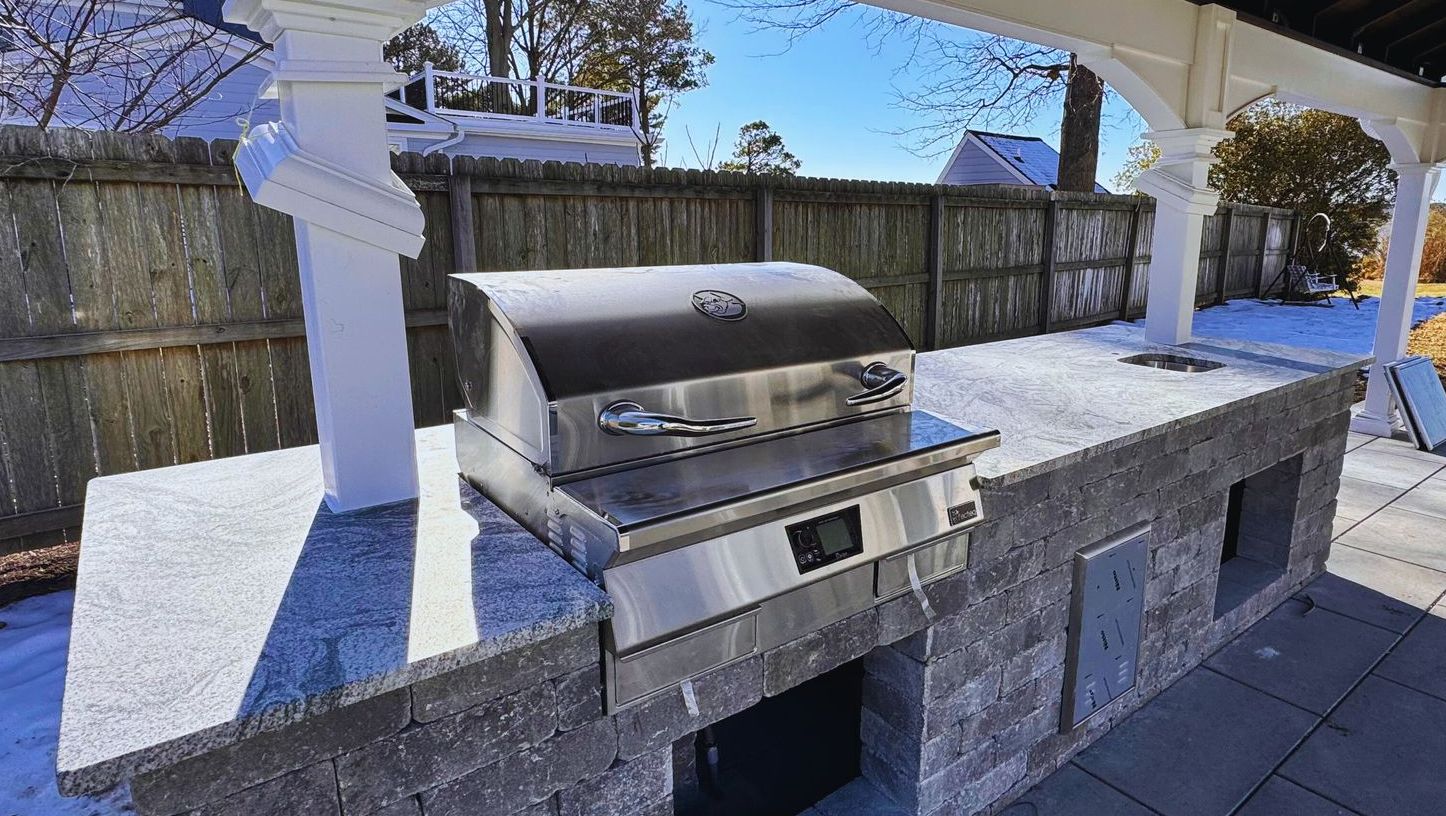What is Edging?
February 3, 2025
What is Edging? A Guide to Different Types of Edging for Your Granite Surfaces

Granite and quartz are some of the most popular materials for countertops, kitchen islands, vanities, and other surfaces. Known for its durability, versatility, and luxurious appearance, granite and quartz can elevate the aesthetic of any space. However, while their surface is often the star of the show, the edging – the border or trim around the stone – plays an equally important role in its overall look and functionality.
If you’re considering granite or quartz for your home, you might be wondering what "edging" refers to and why it's important. Let’s explore what edging is for granite, the different types of edges available, and how to choose the best one for your project.
What is Edging for Granite and Quartz?
Edging refers to the shape, style, and finish of the edges of your countertops or surfaces. While the slab itself is a smooth and polished surface, the edges can be customized to suit the style of your kitchen, bathroom, or other space.
Not only does the right granite edge contribute to the aesthetics of your design, but it also serves functional purposes. For instance, rounded edges can prevent injury from sharp corners, while more intricate edges can add a luxurious, custom touch. The type of edge you choose can also impact the maintenance and cleaning of the countertop.
Different Types of Edging
There are several types of edges, ranging from simple, sleek lines to elaborate designs. The choice largely depends on your style preferences, the functionality you require, and the overall look you want to achieve for your space. Below are some of the most common types of granite edges:
- Straight Edge (Square Edge): A straight edge is one of the most basic and modern styles for countertops. As the name suggests, the edge is straight and sharp, offering a clean and minimalist look. This style works well in contemporary kitchens and bathrooms, where the focus is on sleekness and simplicity.
Pros: Simple and elegant, fits with almost any design style.
Cons: The sharpness of the edge may not be ideal for homes with young children or in high-traffic areas where accidents could happen.
- Pencil Edge: The pencil edge is another popular and simple choice for countertops. This style features a slightly rounded edge that’s similar to the straight edge, but with a gentler, more refined curve. The edge looks like the rounded tip of a pencil, hence the name. While the pencil edge is less ornate than more intricate designs like ogee or Dupont, it offers a clean, elegant look that complements both traditional and contemporary spaces.
Pros: It provides a minimalist yet polished appearance, making it versatile enough for almost any style and a safer choice for homes with children.
Cons: It is less decorative and might not stand out as much in larger spaces.
- Bullnose Edge: The bullnose edge is one of the most popular options for countertops. It has a smooth, rounded curve along the edge, giving it a soft and elegant appearance. Bullnose edges are particularly popular for kitchen counters and bathroom vanities because they are smooth to the touch and can handle a lot of wear.
Pros: Rounded edges are safer, soft to the touch, and easy to maintain.
Cons: Some may feel that it lacks the sharp, crisp lines that give a more modern feel.
- Half Bullnose Edge: This is a variation of the bullnose, where only the top portion of the edge is rounded, leaving the bottom edge square. The half bullnose offers a more subtle curve and combines the sleekness of a square edge with the softness of a rounded edge.
Pros: Easier to maintain than a full bullnose, provides a refined look that balances sharp and curved lines.
Cons: May not be as visually soft as a full bullnose for some design preferences.
- Bevel Edge: A bevel edge cuts the granite at a 45-degree angle, creating a slanted edge. This gives the granite a more contemporary look, and it can be especially effective for creating a more distinct, sharp profile. Beveled edges also make a space feel more streamlined.
Pros: Modern, sleek, and sharp appearance, great for a more geometric design.
Cons: More challenging to clean in the corners, especially if the angle is very steep.
- Ogee Edge: The ogee edge is a classic, elegant design that features an "S" shaped curve, often used in high-end kitchens and bathrooms. This style offers a more ornate, sophisticated look and can add a touch of luxury to your granite countertop.
Pros: Highly decorative, adds visual interest and depth to the countertop.
Cons: More complicated to fabricate, can be more expensive, and requires careful maintenance to avoid damage to the intricate curves.
- Chiseled Edge: A chiseled edge offers a rustic, natural look, often with rough, uneven edges that mimic the appearance of stone as it appears in nature. This style works well in kitchens or bathrooms with a more organic or natural aesthetic, such as farmhouse or rustic designs.
Pros: Unique and rustic, enhances the natural beauty of granite.
Cons: Requires more maintenance and is harder to clean due to its rough texture.
- Dupont Edge: The Dupont edge is a luxurious, thick edge that curves outward before coming back in. It’s known for its elegant and upscale look, making it popular in high-end home designs. This edge is often paired with thicker granite countertops.
Pros: Stylish and upscale, offers a bold statement.
Cons: More expensive and requires a thicker slab of granite, which can add to the cost.
Choosing the Right Granite Edge for Your Space
When selecting an edge for your granite countertops, consider the following factors:
- Style: The type of edge you choose should complement the overall design of your space. A modern kitchen may benefit from sharp edges like a straight or bevel edge, while a more traditional or rustic design may call for bullnose or chiseled edges.
- Safety: If you have young children, it’s advisable to avoid sharp, pointy edges like a straight edge. Rounded edges like the pencil, bullnose, or half bullnose can prevent injury from sharp corners.
- Maintenance: Some edges, such as beveled and ogee, may be harder to clean due to their intricate shapes. A simpler edge, such as an eased or straight edge, is much easier to maintain.
- Cost: More intricate edges, such as ogee or Dupont, may cost more due to the complexity involved in fabrication. Be sure to budget for the style that fits your desired aesthetic and your project.
Conclusion
Granite and quartz countertops are a timeless investment that can last a lifetime, and choosing the right edging is an important part of making your countertops both functional and beautiful. Whether you opt for the sleek lines of a straight edge, the elegance of a bullnose, or the bold statement of a Dupont edge, your countertop’s edge will impact the look and feel of your space.
By understanding the different types of edging available, you can make a more informed decision that will enhance both the aesthetics and usability of your countertops for years to come.


April 9, 2025
Granite is one of the most popular natural stones used for countertops, flooring, and other architectural features. Its striking beauty, remarkable durability, and timeless appeal make it a top choice for both residential and commercial spaces. But have you ever wondered how this stunning stone is formed deep within the Earth? In this blog post, we’ll explore the natural process that creates granite, from its formation to the unique characteristics that make it so special. What is Granite? Granite is an igneous rock, which means it forms from the cooling and solidification of molten rock, or magma, beneath the Earth's surface. As magma rises from the Earth’s core, it cools and hardens, forming a wide variety of igneous rocks—granite being one of the most common and sought after. Granite is primarily composed of quartz, feldspar, and mica, which give it its characteristic speckled appearance. The specific minerals in granite determine its color and pattern, creating shades that range from deep reds, pinks, and blacks to creamy whites and beige tones. Each granite slab is unique, making it a popular choice for anyone looking for a one-of-a-kind natural surface. The Natural Process That Creates Granite The formation of granite takes millions of years and occurs deep beneath the Earth's surface. Here’s a breakdown of the natural process that forms this beautiful stone: 1. Magma Cooling and Crystallization Granite begins its journey as magma, a molten rock formed by intense heat beneath the Earth’s crust. As the magma rises toward the surface, it begins to cool and solidify over thousands or even millions of years. The rate at which the magma cools plays a crucial role in the final texture and composition of the granite. When magma cools slowly, large crystals are able to form, giving granite its characteristic coarse-grained texture. The minerals within the magma—primarily quartz, feldspar, and mica—begin to crystallize as the magma cools. Quartz, which is generally clear or milky in appearance, provides granite with its hardness. Feldspar contributes to the stone’s pink, red, or white hues, while mica adds a shiny, reflective quality with its metallic flakes. The resulting mixture of these minerals gives granite its signature speckled appearance, which can vary greatly depending on the mineral composition and the cooling conditions. 2. Pressure and Heat Over Time As granite forms, it is subjected to immense pressure and heat from the surrounding rock layers. This causes the minerals within the magma to bond tightly together, creating a dense, durable stone. The pressure and heat also help the crystals to grow larger, contributing to the stone's strength. Granite is usually buried deep beneath the Earth’s surface during its formation. Over time, however, natural processes such as tectonic plate movements and erosion bring the granite closer to the surface, making it accessible for extraction. Once exposed, the granite is ready to be quarried and used in various applications. 3. Erosion and Exposure Over millions of years, the processes of erosion and tectonic shifts can gradually wear down the layers of rock above granite deposits, bringing the stone closer to the Earth’s surface. The granite veins and outcroppings that emerge above ground are the remnants of these ancient geological processes. These exposed granite formations can be found in mountainous regions, cliffs, and other natural landscapes, where they often create dramatic, rugged terrain. What Makes Granite Special? Granite’s formation process, combined with the minerals it contains, gives it some unique characteristics that make it a highly desirable material. Here’s what makes granite so special: 1. Durability Granite is incredibly durable. It is one of the hardest natural stones, making it resistant to scratches, chips, and damage from heat (with improper maintenance and care, it can still be scratched, chipped, and stained though). The dense structure formed during its long cooling and crystallization process helps ensure that granite stands up to the rigors of daily use, whether in a kitchen, bathroom, or on exterior surfaces. 2. Aesthetic Appeal The natural color variations in granite make it a visually striking material. From rich reds and blues to deep browns, blacks, and soft whites, granite slabs come in an array of hues that complement various design styles. The intricate, speckled patterns and veining are part of the unique fingerprint of each slab, ensuring that no two pieces of granite are ever exactly the same. 3. Heat and Stain Resistance Granite’s high mineral content gives it excellent resistance to heat and staining. Unlike other natural stones, granite won’t absorb liquids easily, making it an ideal choice for kitchen countertops where spills and hot cookware are common. With proper sealing and care, granite remains resistant to common stains like oil, wine, and coffee, which can sometimes damage more porous stones. 4. Longevity Granite is incredibly long-lasting. Because it is so durable and resistant to damage, granite surfaces can last a lifetime when properly maintained. Its natural beauty also doesn’t fade with time, meaning that your granite countertops, flooring, or outdoor surfaces will remain visually appealing for many years. 5. Environmental Sustainability Granite is a natural stone that is quarried directly from the earth, and when sourced responsibly, it is considered an eco-friendly material. Granite is abundant, and unlike some synthetic materials, it doesn’t require large amounts of energy to produce. Additionally, granite’s durability means that it won’t need to be replaced as often as other materials, making it a long-term investment for your home or building project. Final Thoughts Granite’s formation is a fascinating natural process that involves millions of years of geological forces, including magma cooling, mineral crystallization, and immense pressure. This stone’s durability, beauty, and uniqueness are the result of these long geological processes, making granite a valuable material for a wide range of applications. Whether you’re using granite for countertops, flooring, or even exterior features, the natural process behind its creation ensures that each piece is as resilient as it is beautiful. With its distinctive patterns, rich colors, and enduring quality, granite remains a top choice for homeowners and designers looking for a timeless, natural material that will stand the test of time.
March 21, 2025
Quartz countertops are one of the most popular choices for modern kitchens and bathrooms, and for good reason. Engineered from natural quartz crystals mixed with resins and pigments, they offer a durable, low-maintenance alternative to granite, marble, and other natural stone surfaces. With a non-porous surface, quartz is resistant to stains, bacteria, and scratching, making it an excellent choice for busy households. However, while quartz countertops are more forgiving than many other materials, they still require some care to keep them looking their best. In this post, we’ll guide you through essential tips for quartz countertop maintenance and cleaning to ensure that your surfaces stay beautiful and functional for years to come. 1. Cleaning Your Quartz Countertops One of the key benefits of quartz is that it’s non-porous, meaning liquids, stains, and bacteria won’t seep into the surface. This makes cleaning quick and easy. How to clean quartz countertops : Daily Cleaning : Use a mild dish soap and warm water solution to wipe down the countertop with a soft cloth or sponge. A gentle microfiber cloth works best to avoid scratching the surface. Tougher Cleaning Jobs : For tougher stains or sticky residue, use a gentle all-purpose cleaner or a specially formulated quartz cleaner. Avoid cleaners that contain bleach, ammonia, or other harsh chemicals, as these can break down the resin and damage the countertop. Wipe Up Spills Promptly : While quartz is stain-resistant, it’s still a good idea to clean up spills as soon as they happen. Liquids such as coffee, wine, or juice can leave marks if left sitting for extended periods. 2. Avoiding Heat Damage Unlike granite, quartz countertops are not as heat-resistant. Extreme temperatures can damage the surface, causing discoloration, cracks, or the resin to degrade. Tips to avoid heat damage : Use Trivets and Hot Pads : Always place hot pans, pots, or baking sheets on trivets or hot pads instead of directly on the quartz surface. Avoid Direct Contact with High Heat : Don’t place hot cookware (e.g., a frying pan or roasting pan) on your quartz countertop straight from the stove or oven. Sudden temperature changes could cause the countertop to crack or discolor. 3. Preventing Scratches Quartz is quite durable, but it’s still important to take care to prevent scratches that could diminish the appearance of your countertop. How to prevent scratches : Use Cutting Boards : Always use a cutting board when chopping, slicing, or dicing. While quartz is harder than granite, it can still be scratched by sharp knives. Avoid Rough or Abrasive Tools : Do not use steel wool or abrasive pads on the surface, as they can cause scratches and damage the smooth finish of your countertop. Be Cautious with Heavy Objects : Heavy pots, pans, or other objects can leave marks if dropped on the quartz surface. Be mindful when handling items on the countertop. 4. Stain Removal on Quartz Countertops Although quartz countertops are highly stain-resistant, certain substances—such as coffee, red wine, or food with high pigment content—can leave a mark if not cleaned quickly. How to remove stains : Soap and Water : For most stains, cleaning with warm water and mild dish soap is usually sufficient. Use a Non-abrasive Cleaner : For more stubborn stains, a non-abrasive cleaner or a mild degreaser can help break down the stain. For Dried-on or Sticky Substances : Use a plastic scraper to gently lift off any dried food or sticky residue. Be sure not to use metal scrapers, as they may scratch the surface. Baking Soda Paste : For deeper stains, you can create a paste using baking soda and water. Apply the paste to the stain, let it sit for 10-15 minutes, and then wipe it away with a damp cloth. 5. Polishing Quartz Countertops Unlike granite or marble, quartz doesn’t require regular polishing or sealing, as it naturally has a glossy finish. However, if you’d like to enhance the shine or restore some luster, a quartz-specific polish can be used. How to polish quartz : Use a Quartz-Specific Polish : When you want to restore the shine, use a non-abrasive quartz polish that’s specifically designed for engineered stone surfaces. Buff Gently : Apply the polish with a soft microfiber cloth in small sections, buffing in circular motions to bring out the surface’s natural luster. 6. Handling Chips and Cracks While quartz is highly durable, it’s not completely indestructible. If a heavy object is dropped or a sharp impact occurs, chips or cracks may form. What to do if you notice chips or cracks : Small Chips : For minor chips, a professional repair specialist may be able to use resin fillers to fix the damage and restore the surface’s appearance. Larger Cracks : For larger cracks or damages, it’s best to contact a professional who specializes in quartz countertop repairs or replacement. In some cases, the damaged section might need to be replaced entirely. 7. Avoiding Staining from Oils and Grease While quartz is resistant to most types of stains, oils and grease can sometimes leave marks if left on the surface for an extended period. It’s best to wipe up oils, butter, or greasy foods promptly. How to avoid staining from oils : Quick Clean-Up : Wipe away oils or greasy substances right after use. A simple cloth or paper towel will usually do the trick. Use a Coaster or Tray : For items that contain oils (like a bottle of olive oil or greasy takeout), consider using a coaster or tray to catch any accidental spills. 8. Regular Inspections Finally, it’s always a good idea to inspect your quartz countertops regularly for any signs of damage. Although quartz is low-maintenance, checking for any visible cracks, chips, or stains can help catch issues early before they become more significant problems. Conclusion Quartz countertops are a beautiful, functional addition to any home, and with the right care, they can maintain their stunning appearance for years. By cleaning regularly, protecting against heat and scratches, and taking care of stains promptly, you can enjoy the beauty and practicality of your quartz surfaces without the need for excessive maintenance. Remember, quartz is a durable and low-maintenance material, but a little effort will go a long way in keeping it looking its best. By following these simple care tips, your quartz countertops will continue to shine and add value to your home for many years to come.
Learn More About MGL Granite Inc
With two locations, Hampton and Norfolk, VA, MGL Granite Inc specializes in granite countertops, quartz countertops, cabinets, and countertop and cabinet installation. We are currently offering 10% off for new customers. We have in-house fabricators and installers. Call today for a free estimate.
Norfolk LOCATION
1135 Lance Road
Norfolk, VA 23502
Call or Text: (804) 878-0986
Email: mgl1granite@gmail.com
Business Hours
Hampton Office
- Mon - Fri
- -
- Saturday
- -
- Sunday
- Closed
Norfolk Office
- Mon - Fri
- -
- Saturday
- -
- Sunday
- Closed
Hi. Do you need any help?
Privacy Policy
| Do Not Share My Information
| Conditions of Use
| Notice and Take Down Policy
| Website Accessibility Policy
© 2025
The content on this website is owned by us and our licensors. Do not copy any content (including images) without our consent.


Share On: